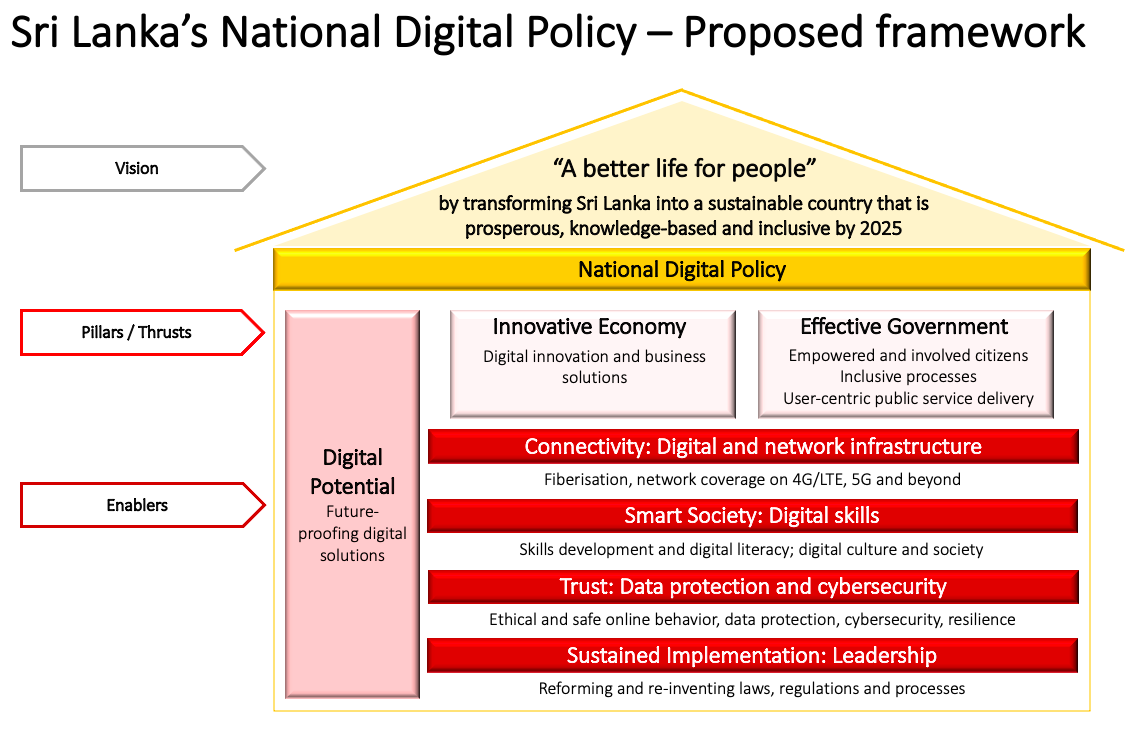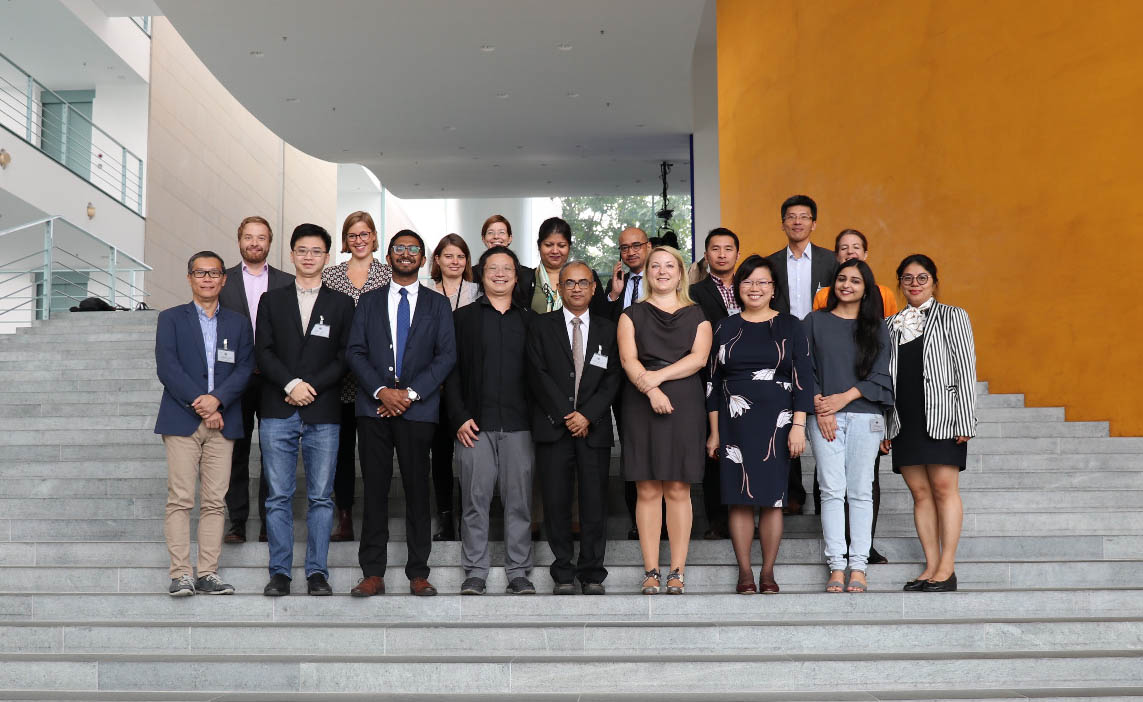Policy and Regulation
Policy and Regulation
With the foundation of Sri Lanka’s apex body on ICT policy, ICTA, in 2013, an ICT Act was also written for the country. A requirement of this Act, which Rohan helped draft as Board Member of ICTA at the time, was a national digital policy for Sri Lanka. The policy itself never was drafted, and when Rohan returned to ICTA as Chairman of the Board of Directors in April 2018, he set out to fill the gap.

Tahani and Gayani supported this process. They benchmarked other countries, not only in developing Asia but also Singapore, Malaysia, UK, Canada etc., and how they had approached digital policy. We also looked at Sri Lankan policies on economics and other cross-cutting sectors that made mention of or would affect digital policy. The material we provided to ICTA was an overarching document that made recommendations as to how the government of Sri Lanka should adopt digital policy. We recommended an inclusive policy that considered the disabled, the ageing and otherwise marginalized communities. We recommended an open-source approach and we recommended transparency. We also recommended that the policy be an umbrella document that cuts across sectors, identifying basic policies for all sectors and guiding them in the creation of sector-specific digital policies, for consistency.
The final policy itself, drafted by ICTA, was released for public consultation in August 2019, and incorporated much of our recommendations. The document has now passed the inter-ministerial committee approval and remains to be presented at cabinet.
We also provided extensive formal input on two separate laws proposed by the Government of Sri Lanka: the Data Protection bill and the Cybersecurity bill. The first draft of the Data Protection bill prohibited automated decision making, which we believed was problematic. The final draft now contains a revision that now allows with a data subject retaining the right to seek an explanation for any automated decision. The Cybersecurity bill proposed an institutional structure which contained many new institutions which would complicate implementation and accountability. The proposed definition of Critical Internet Infrastructure and the process for classifying these was also problematic. Our comments in each of these areas was taken on board and reflected in changes in the newer version.
Broadcasting Regulatory Commission Bill
In January 2018, the Minister with responsibility for Media requested Rohan Samarajiva to serve as chair of the Working Committee to Regularize Issuance of Radio and TV Licenses. As is usual in Sri Lanka, the Committee had no research capacity. LIRNEasia supported the work of the committee by engaging the services of Ms Sabina Fernando, a LIRNEasia alumna with considerable experience in legal drafting and media policy. Following an intense effort of seven months, a complete draft of an Act and a cover memo were handed over to the Ministry. Unfortunately, progress was stalled by changes in Ministerial responsibilities. However, the draft re-emerged in the aftermath of the 2019 Easter Bombings. It was translated and made ready for public consultation. It was reported that it had been submitted to Cabinet by the new government.
Media regulation is perhaps one of the most sensitive and difficult policy problems. In the absence of licenses with any meaningful conditions or even fees, electronic media firms can do more or less anything they want. They may also be shut down at any time without due process. The iron triangle supporting the status quo is strong. Rapid technological and market changes, usually described as convergence, make the design of regulatory instruments quite challenging. The Committee did come up with an innovative solution that we hope will be implemented when the conditions are right.
Broadband policies and universal service for Asia
The ASEAN-USAID Inclusive Growth in ASEAN through Innovation, Trade, and E-Commerce (ASEAN-USAID IGNITE) co-hosted a consultative workshop with the International Telecommunication Union (ITU) and the Indonesian Authority on Accessibility and Telecommunications (BAKTI) titled :Approaches to ASEAN Next Generation Universal Service Obligation (USO 2.0). The meeting took place on 25 and 26 July 2019 in Jakarta, Indonesia. The meeting provided a platform for ASEAN regulators and policymakers (primarily from Indonesia, Malaysia, Brunei, and Cambodia), regional telecommunications industry representatives, academics, researchers and USO experts to discuss the status of national broadband policies in ASEAN and share insights on international best practices in USO funding to address connectivity and inclusion in the region.
LIRNEasia representative, Tahani Iqbal, participated in two panel discussions over the two-day workshop. The first session she spoke in focused on "Overview and Examples of Broadband Policies: Lessons and Considerations for Developing New Frameworks", Drawing from the findings of the AfterAccess surveys, she highlighted the need for policymakers to address challenges related to affordability, relevance, readiness, as well as access. For example, even where comprehensive national broadband plans existed and internet connectivity and access were available, the 2018 AfterAccess research findings showed that actual internet use was in fact still low (36% in Cambodia among 15-65 aged population). This was due to poor awareness and digital literacy and low smartphone ownership (only 30-50% of the 15-65 aged population had access to an internet-enabled device across emerging Asia). These findings were appreciated as the proposed ITU USO 2.0 framework also emphasized the need for USO funds to consider demand-side activities such as digital training and capacity building programs as part of their efforts to get more people connected and online.

During the second session titled "Updating and Enhancing Universal Service Funds and Funding a New Universal Scheme", Tahani shared the findings from Samarajiva and Hurulle's (2017) research on select USOs in the region. In essence, the paper suggested that USO funds, if left undisbursed, remained an ineffective tax on the telecommunication sector, and asserted that the success of USO funds should be evaluated, through identification of outcomes (for example, how many people who would not be connected through market mechanisms were connected as a direct result of universal-service subsidy programs?) and through outputs (for example, were the funds utilized as intended by the legislation/policy?). A necessary condition for these measures of success was that the funds should have indeed been disbursed. The ensuing discussion focused on how USOs could be revitalised to be more effective and relevant in the region.
Continuing global engagement with broadband quality of service experience
September 2019, Shazna was in Geneva again as part of the ITUs Expert Group on Telecom Indicators to present the revised methodology on broadband quality of service experience measurement and data that had been collected based on the revised method, for the years 2017 and 2018. The Expert Group on Telecom Indicators recommended that the methodology be again revised, for the September 2020 meeting. The Sub-group on ICT indicators was therefore reinstated and the work continues.